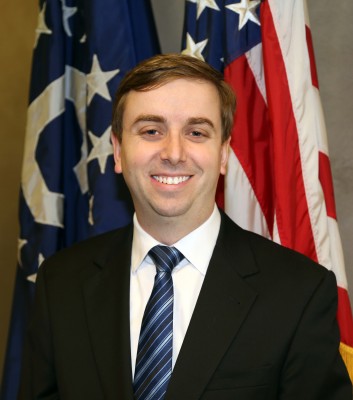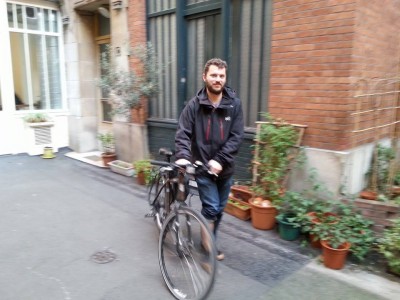As appearing in the Rocky Mountain Collegian
Pictured at left: the U.S. Embassy in Beijing, China.
Picking everything up and leaving to work in a new country is no more than a dream for some, but others have been able to make it a reality by landing a job abroad after graduating from CSU having studied languages.
Two liberal arts alumni are currently working abroad while having diverse cultural experiences in their daily lives thanks to their language skills.
Travis Hall: Foreign Service Officer at the U.S. Embassy in Beijing, China
Hall graduated from CSU in 2010 with a degree in political science and a minor in Chinese. He said he had been interested in working for the Foreign Service for some time. He now serves as a U.S. diplomat in embassies and consulates overseas as a commissioned Foreign Service Officer with the Department of State.
“I had been interested in the Foreign Service since freshman year, but studying Chinese, traveling to China with a group of CSU students led by our teacher Chuchang Chiu and then doing a semester in Shanghai really solidified my intent to apply,” Hall said.

In order to work with the Foreign Service, applicants must complete a test for the Foreign Service and then successfully complete the rest of the application process, which includes an oral assessment and a security check, according to the U.S. Department of State website.
“Everyone who joins the Foreign Service comes in through a merit-based system of tests, and I took the written Foreign Service Officer Test in February 2010, during my senior year,” Hall said. “I was sworn in at a ceremony in Washington, D.C. a year later. After six months of Spanish language training at the Foreign Service Institute in Virginia, I was sent to my first assignment in Tegucigalpa, Honduras.”
Working abroad presents some differences, but for Hall, living abroad has allowed him to meet new people and build friendships.
“When I start to enjoy living in any new place comes down to how quickly I can make connections and build friendships,” Hall said. “Once I’ve put down some roots and know my neighbors’ names or who makes the best dumplings on the block, the place starts to feel a bit more like home.”
For Hall, being abroad also taught him about the U.S.
“I’ve heard that you learn more about your home country than you do about the country you are visiting when you travel, and I think that is true,” Hall said. “Living overseas, I have learned to appreciate even more good roads and good Internet, and figured out why we have crosswalks and building codes that mandate things like no-fee restrooms and handicap accessibility.”
Yet living abroad does come with some challenges. Staying connected with people in the U.S. is among one of the most challenging, Hall said.
“While it is getting easier in the age of Skype, staying connected with family and friends back home remains a challenge, especially in places where Facebook is blocked,” Hall said. “My family has also been understanding when, for work reasons, I’m not able to make it back to the States for all of the major holidays.”
Hall recalled one of his most rewarding experiences with the Foreign Service, assisting in the coordination of a rescue effort during his time in Honduras.
“I remember getting the call after-hours that a boat of nine U.S. and Honduran citizens had not shown up at its intended destination after what should have been a short trip, and feeling more than a little helpless as we made calls to other private ships, ports, hospitals, the police and the Honduran Navy in an effort to track them down,” Hall said. “It was during one of these calls with the Coast Guard that I got the news that they had spotted the missing boat and a U.S. Army UH-60 helicopter was hoisting the survivors to safety. Being able to communicate the great news to the family of the rescued Americans and put them in contact with their loved ones after they landed was an overwhelmingly rewarding experience, and the memory will certainly stick with me for the rest of my career.”
Ethan Footlik: Freelance Translator in Mexico City, Mexico
After graduating from CSU in 2005, Footlik moved to France and worked as an English assistant for a year, eventually returning to the U.S. to complete a master’s degree at the University of Wisconsin in French and European Affairs. He then moved back to Paris and after some time settled in Mexico City, Mexico.

“I found a job in Normandy as a translator,” Footlik said. “I’ve had several jobs since, but pretty much everything’s been in translation.”
Footlik moved to Mexico City after his time in France, but continues to work in translation from French to English. He has been in Mexico for about a year and a half.
“I lived in Paris for five years,” Footlik said. “I love Paris, but it’s a city that can take a toll on you. We wanted to move somewhere to get a breath of fresh air, discover a new place and learn Spanish.”
Footlik hopes to one day translate from Spanish as well once he masters the language.
“My Spanish isn’t good enough yet to translate from Spanish,” Footlik said.
As a freelance translator, Footlik works for an agency and translates a variety of works.
“The exciting thing is you never know what’s going to end up on your desk,” Footlik said. “I translated a series of memoirs and first-hand accounts of French people from Normandy who were there during the Normandy landings, and all the accounts were on their interactions with the U.S. soldiers who had arrived.”
Footlik studied abroad for a year in Clermont-Ferrand, France during his junior year at CSU and said the experience influenced his eventual move to France.
“I arrived with a shaky command of French and only basic knowledge about France,” Footlik said. “I returned to CSU with a lot more confidence, a better grasp of both grammar and informal language and new friends. It was an exhilarating mix of new people, food and culture that inspired me to move to France for the long-term.”
Now, living abroad for Footlik has changed his personality and has made him look at things more critically.
“One thing I really enjoy about living abroad is that it makes you question your assumptions and think about who you are,” Footlik said. “In a way, you start from scratch in terms of how you present yourself, so it’s an opportunity to become the person you want to be. You come into contact with people who haven’t spent much time with an American, so it’s a chance to dispel any misconceptions that you and they may have about each other’s countries. And, while learning about the country where you are living, you are also forced to articulate how you view your country and ultimately yourself, which can be a useful exercise.”
Footlik said that aspiring translators should have a good writing ability in English as well as in their chosen foreign language, and to know the importance of networking. Likewise, his advice for those wanting to work abroad in areas other than just translation is to be persistent, and understand that workplace practices in other countries may be different.
Collegian Reporter Megan Fischer can be reached at news@collegian.com or via Twitter @MegFischer04.
